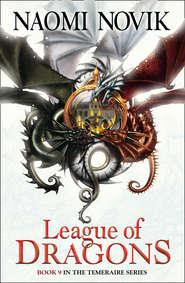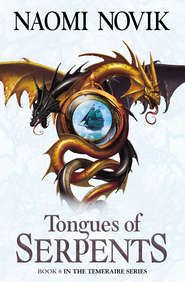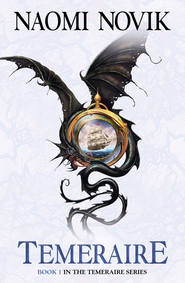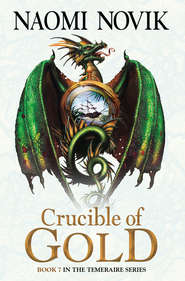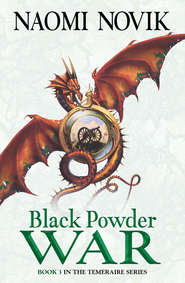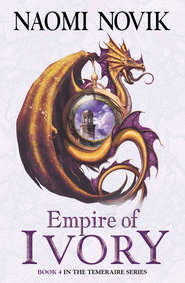По всем вопросам обращайтесь на: info@litportal.ru
(©) 2003-2024.
✖
Blood of Tyrants
Автор
Год написания книги
2019
Настройки чтения
Размер шрифта
Высота строк
Поля
Ferris hesitated; he looked a great deal better lately, Temeraire had even before now noticed and approved: he could not help but congratulate himself for it, and see in it evidence that he was not a careless guardian of his crew, despite all their trials amongst the Inca and since.
Certainly Ferris was happier than when he had first come back to them in New South Wales; he was not so weary-looking, and the ruddy blotches which had marred his face then had cleared. He looked nearer his four-and-twenty than he had, and if he did not wear a green coat—Temeraire did not understand why Hammond had not straightened out that matter yet—at least the coat which he did wear, brown, was neat and trim and with silver buttons; and he took excellent care of his linen, which was properly white.
“You ought have taken Forthing,” Ferris said abruptly.
“Oh, Forthing,” Temeraire said, with a flick of his ruff. “Whyever for? I do not see why I ought to be giving Forthing any special notice: he is very well, I suppose, for ordinary work.”
“He is an officer of the Corps,” Ferris said, “and I—I am not; he is your first lieutenant.”
“You were, before him,” Temeraire said, “except for Granby; whom I cannot ask to come away from Iskierka under the circumstances. I do not take any notice of what some silly court-martial may have said, Ferris: I hope you do not think I do, and you ought not, either. Why, they declared Laurence should be put to death; you cannot imagine their judgment holds any water with me, or anyone of sense.”
Ferris was silent, and then he said, “You wouldn’t be taking Forthing up, no matter what, I suppose.”
“Taking him up?” Temeraire said. “I am perfectly happy for him to ride, when the rest of the crew do,” although this was not entirely true: with as much opportunity as Ferris had been given, during their brief stay in Brazil, Forthing had not bothered to repair any of his wardrobe but what had outright holes in it; his green coat was faded almost to grey, his neckcloth a disgrace, and his trousers frayed at hem and seams. It was an embarrassment, and all Temeraire’s hinting had gone unheeded entirely.
“No, I mean,” Ferris said, hesitated, and said, “if Captain Laurence—if we should not—”
Temeraire was still quite puzzled a moment; then he understood, and indignation swelled his breast. “I should not take that slovenly third-rate—piker for my captain if he were the last person to be had on the earth,” he said, heatedly. “Oh! Him, to succeed Laurence: I should like to see it! If the Admiralty should dare to propose it, I should go to Whitehall and bring the Navy Offices down about their ears.
“Anyway,” he added, in the teeth of his own anxiety, “I am sure Laurence will look after himself very well, until we can come get him: oh! Why are they taking so very long about getting aloft?”
The flight was not a long one, the coast rising ahead of them as they flew, the waters still depthless blue-black beneath. Dulcia and Nitidus sped on ahead in spite of Hammond’s cries of protest, but they circled back to meet the rest of them shortly before they all came over the coast: they had seen a few small fishing-boats, they reported, and a great many large half-drowned rice fields, with the beginnings of green shoots.
“But nothing very nice to eat,” Nitidus said sadly. “Why, I did not even see a sheep, or a goat.”
“Thank Heaven,” Temeraire could overhear Hammond say, foolishly: it would have been nice to know sheep might be had, even if they could not easily be got.
Captain Warren fetched Nitidus a buffet to the shoulder, and raised his speaking-trumpet to call over from his back, as they fell back into formation, “More to the point, there’s a bay straightaway three points to the north, with pine-trees as handsome as you could like.”
The bay was isolate, the glossy black water’s surface broken with a great many lumpy protruding rocks which likely made it inconvenient for fishing-boats, and showed no signs of use except a low stone wall which did not seem to have any purpose at all; it only ran along the shore in either direction. Hammond let himself down from Churki’s back clumsily but with haste the instant they had landed, and hurried to inspect: it was overgrown with a carpet of pale short green grass. “I see no sign of any other sort of traffic,” he said, with great relief, when he had straightened up, “so now pray let us get the trees and be away: at once, at once. I shall account all arrears of Fortune paid off, if only we should escape without notice.”
Lily cocked her head, considering, and said, “I suppose we should like them to fall inwards: stand back, all of you, if you please.”
“And to the north,” Captain Harcourt added, from her back, looking at the narrow wind-socks which stood up from Lily’s harness at various points. “Sing out when you are all safe away.”
Temeraire waited until Hammond with the rest of the company was moving, hastily, out of any chance of Lily’s acid spattering, and then announced, “I will go aloft, and see if I can make out anything more of the countryside: I should not like to disappoint Iskierka.”
In point of fact, he was quite willing to disappoint Iskierka if there were no cows to be had; but so long as they were here on land, Temeraire did not see any reason not to have a look around for Laurence. “Of course we are not likely to see him,” he added to Ferris, over his shoulder, as he flew quickly away before he might have to hear Hammond shouting protests after him, “but if only we should happen to, how convenient that would be: even Hammond could not complain, then. And even if we do not, we will have saved some time, later; we will not have to search here again. We will not go far, we will only go along the coast—”
Indeed, he did not go so far that he did not hear the thundering crash of the first pine, coming down; he did not wish to risk overlooking any sign. The coast was mostly rocky, save for a few other inlets and narrow streams coming down, but not very high. “I do not think it would be excessively difficult to get safely ashore, for a man swimming,” Temeraire said to Ferris.
Ferris said, “There aren’t cliffs, at least,” in a consoling way. “Shan’t we turn back, now? Those fishermen there are sure to see us if only they look up, and I think that must be a harbor over there—”
“But there are a few more beaches in this direction,” Temeraire said. “We shall go and have a look at those, from the air: I am sure they are too busy fishing to pay any attention to—”
He was interrupted in this optimistic speech by a sudden bellowing roar, loud and strangely gargled: he turned back hurriedly. “I do not see anyone in the air,” Temeraire said, uncertainly, peering in every direction: the day was clear, and he could not imagine where the roar had come from. “Perhaps it was only another pine coming down—”
“That noise was no tree-fall,” Ferris said, urgently, and Temeraire could not disagree however much he wished to do; he turned back towards the bay and crested the trees just in time to find, to his appalled surprise, Maximus and Lily and the others all mantling towards a monstrous sea-serpent rearing itself up out of the bay. The rocks were not rocks at all; they were a part of its body, and it was twice as big as Maximus even only in the parts which Temeraire could see.
And then Temeraire realized he was wrong: it was not a serpent; it was a dragon, with forelegs out upon the sand: only it was very long, and with stubby wings. It opened its mouth and made another roaring noise, a deep angry growling demand at the formation, which carried over the water clear enough, but in some language which Temeraire did not recognize.
They stood all amazed a moment, regarding one another, very much like figures upon a war-table from Temeraire’s distant view. When none of them answered, the serpent-dragon reached for the second tree, which had struck partway into the water. Lily sprang forward and put her talons upon it; the great dragon made a dismissive snort in her direction, which needed no translation.
Temeraire beat urgently towards them as Lily raised her wings and flared them out a little: the brilliant orange and purple would have warned any European beast, and their immense wingspan, but it was no surprise if the Japanese dragon did not recognize her as a Longwing, or did not know what that meant; and she was not a third his size. Temeraire saw Captain Harcourt, a tiny figure, lean forward on Lily’s neck and point to the sand; Lily turned her head and spat a thin demonstrative stream of acid, to make her point.
The serpentine dragon drew back from the hissing black stench and the thin trails of smoke, its own small wings flattening against its back, and then it plunged its head into the water and opened its jaw wide. The dragon, already so massive but slender, began now to rapidly swell up and out to the sides: Temeraire could not understand in the least how he was managing it, and then the dragon reared itself back out and up, and up, and up, and it blasted Lily and all the others with a torrent of water.
“Oh!” Temeraire cried, “Oh, it is a Sui-Riu!” that variety of dragon being known to him from Sir Edward Howe’s work on the Oriental breeds, but as he flew towards them as quickly as ever he could, he thought with some strong indignation that Sir Edward might have mentioned the immense—the truly immense—scale; and the book had not in the least conveyed the true impact of the water-spouting.
Even Maximus had been swept off his feet, and was now tangled and struggling up against the tree-line; Lily was coughing and sputtering, having taken the brunt of the torrent, jerking her head, and Nitidus and Dulcia had been carried into the bay itself and were floundering in the waves. Immortalis and Churki were a tumbled sand-clogged mess flung into the woods, trying to get their footing again; Sutton and Messoria, having stationed themselves back and apart, were a little better off and getting into the air.
But the Sui-Riu evidently had no intention of letting them get their bearings back: he had plunged his head back into the water and was inhaling again. He might blast them on the far side, and so sweep more of them into the water, where he would certainly have an advantage, since he could breathe through it: unsporting, except that to be fair he was one against eight.
However, Temeraire could not give him much credit for that: no-one had asked the Sui-Riu to be so unfriendly. Lily had given the most polite warning one could ask for—if she had liked to be similarly nasty, she might have taken the Sui-Riu directly in the eye with her shot. Temeraire worked his lungs as he flew, gathering breath, and even as the Sui-Riu drew himself up out of the water again, Temeraire dived towards him, roaring in full and terrible voice.
The waters of the bay shuddered from the divine wind, the surface going for a moment bowl-like and concave; the Sui-Riu was bowled over onto his side with an immense splash, and his torrent erupted involuntarily and spilled harmless over the water, merely adding more turbulence. But the distance was too great, or else perhaps the water somehow absorbed some of the impact; the Sui-Riu managed to right himself in the water, and did not look so dreadfully injured as did most dragons who had borne the direct brunt of the divine wind. Only a little blood trickled black from his right ear, over scales that were a deep greenish black the color of dry seaweed, and his eye on that side was bloodshot: otherwise he seemed quite all right, and great sharp fins were rising up angrily all over his back, like blades.
But Temeraire was hovering off the shore, now, closer; and Maximus and Lily were righting themselves. The others fell into line behind Lily, taking up their formation-positions. Temeraire did not much like formation-fighting, but one could not deny its tactical usefulness, and the Sui-Riu evidently did not have any difficulty recognizing his increasing disadvantage. Shaking away the last of the effects, he looked up at Temeraire, and his eyes—a great slitted pale grey that looked nearly white—drew thin and narrow.
The Sui-Riu rumbled some remarks in a most angry tone, sounding more like a distant thundercloud than anything else. “I do not have any notion what you are saying,” Temeraire informed him loudly, in Chinese, “but you needn’t complain of us, when you attack people out of nowhere—if you should—”
But as abruptly as he had emerged before, the Sui-Riu was gone: in one smooth motion he plunged beneath the dark murky waters of the bay, clouded even further now by silt and sand raised in their exchange. One long barnacled curve of tail breached the water, and was gone: though Temeraire held position a long time, he did not break the surface again.
Chapter 3 (#ulink_78131cb9-f06c-5ae9-8617-9dbcef7ddba0)
The lanterns were coming alight, one after another, all through the house. Laurence could trace the servants moving in waves as the glow spread behind the walls. The sentry at the door was waking with a snorting start and jerking to his feet, blinking around. Laurence for a moment considered: the man was paunchy and sleep-dazed, armed only with a short blade—a quick struggle might see him through—
But the dragon was descending from aloft—the dragons, rather, for there were two immense black shadows against the milky wash of the moonless night, coming into the lamp-light. One, the larger, had wide green eyes that glowed like a cat’s: it was not looking at him presently, but if it could see in the dark, like the Fleur-de-Nuit, nothing could be easier than for the beast to hunt him down while he fumbled over unfamiliar ground in the dark.
Quickly, Laurence turned instead and thrust his small bundle into the ornamental bushes planted against the side of the house, and then went and stood by the door of the house to wait, as though he had been brought there. The sentry looked at him in confusion, but Laurence looked back at him with unmoving face, brazening it out, and the man was in a moment overwhelmed by a sudden flow of servants hurrying out into the garden. Junichiro appeared by Laurence’s elbow.
“What are you doing out here?” the young man demanded, but preoccupied himself did not wait for an answer; instead he seized Laurence by the arm and drew him along with the flow of people. “They have certainly come on your account,” he said, “so you may as well stay here.”
Kaneko was coming out of the house himself, dressed in formal robes; he wore two blades at his belt and came past his servants, who had arrayed themselves in a square as neat as any infantry troop. Two last men were hurrying around the perimeter of a great flagstoned courtyard, lighting lamps all around it, and then they all knelt together as the dragons came descending into the square, Kaneko out ahead of the rest of the party.
The dragons settled themselves neatly upon the ground; the larger, grey in body and something the size of a middle-weight, wore curious pale green silken dressings the color of its eyes wound about its neck and wing-tips and forelegs, which coming loose made graceful arcs about its body like sails spilling their wind. It had not a single man aboard. The smaller dragon, a brilliant yellow beast larger than a Winchester though not up to combat-weight, carried four: of these, the lead gentleman was dressed in elaborate and formal robes bearing signs of some sort of office, and the others were evidently servants who carried boxes and one an armful of scrolls, and preceding him down unfolded a set of steps to enable him to make a more ponderous and imposing descent.
The grey dragon bent its head towards Kaneko while the men dismounted. It spoke to him in the Japanese tongue, and he bowed more deeply and said something back. Laurence caught the name Arikawa out of it, but he saw no women; perhaps these were Lady Arikawa’s emissaries, and he could see nothing to bode well for his future in their cold faces.
There was a little more formal exchange between them, which Laurence could not follow: he was all the more conscious of his utter isolation, of himself as a prisoner among strangers, unable even to pick out a word or to conceive their intentions. The servants were dismissed; the guests and Kaneko went inside the house; Junichiro took him by the arm and drew him along after them. They turned immediately from the entryway into a chamber on the side, whose entire outer wall was slid back and left wide open to face upon the courtyard where the dragons had settled themselves.
The servants brought great kettles of steaming sharp-nosed tea out to bowls laid before the beasts. The official and Kaneko were served afterwards; they drank, making what Laurence assumed from their tone was mere small conversation, until abruptly he was drawn in front of them, and without hesitation or change of demeanor the official addressed him in Chinese and said, “What is your purpose in coming to our nation?”
“Sir,” Laurence said, “I have no purpose but to be restored to my country-men, and my ship if at all possible.”
It was the opening salvo of an interrogation which proceeded despite the hour of the night, and was as frustrating to Laurence as it was to his interlocutor. He could not but be conscious of the impossibility of avowing himself unable to remember his purpose. Better to be thought a liar than a lunatic, he was sure, but unable to confess this truth, he felt every other word hung upon a knife-edge of honor. He did not know why he was here, and therefore could not say with honest confidence that he meant them no injury. What if the Japanese sheltered some French ship, which he pursued?
“I am a shipwreck: I did not choose to be thrown on your shore, and my presence here is the merest accident,” he said again, the best he could do. “And as you have received no declaration of war, from Britain, nor any envoy,” he added, hoping as much was true, “then, sir, I hope you will believe I am not here as your enemy. You surely cannot imagine me intended in any way to be a spy, and His Majesty’s Government does not behave in so underhanded a manner as to attack another nation with no warning or quarrel.”






